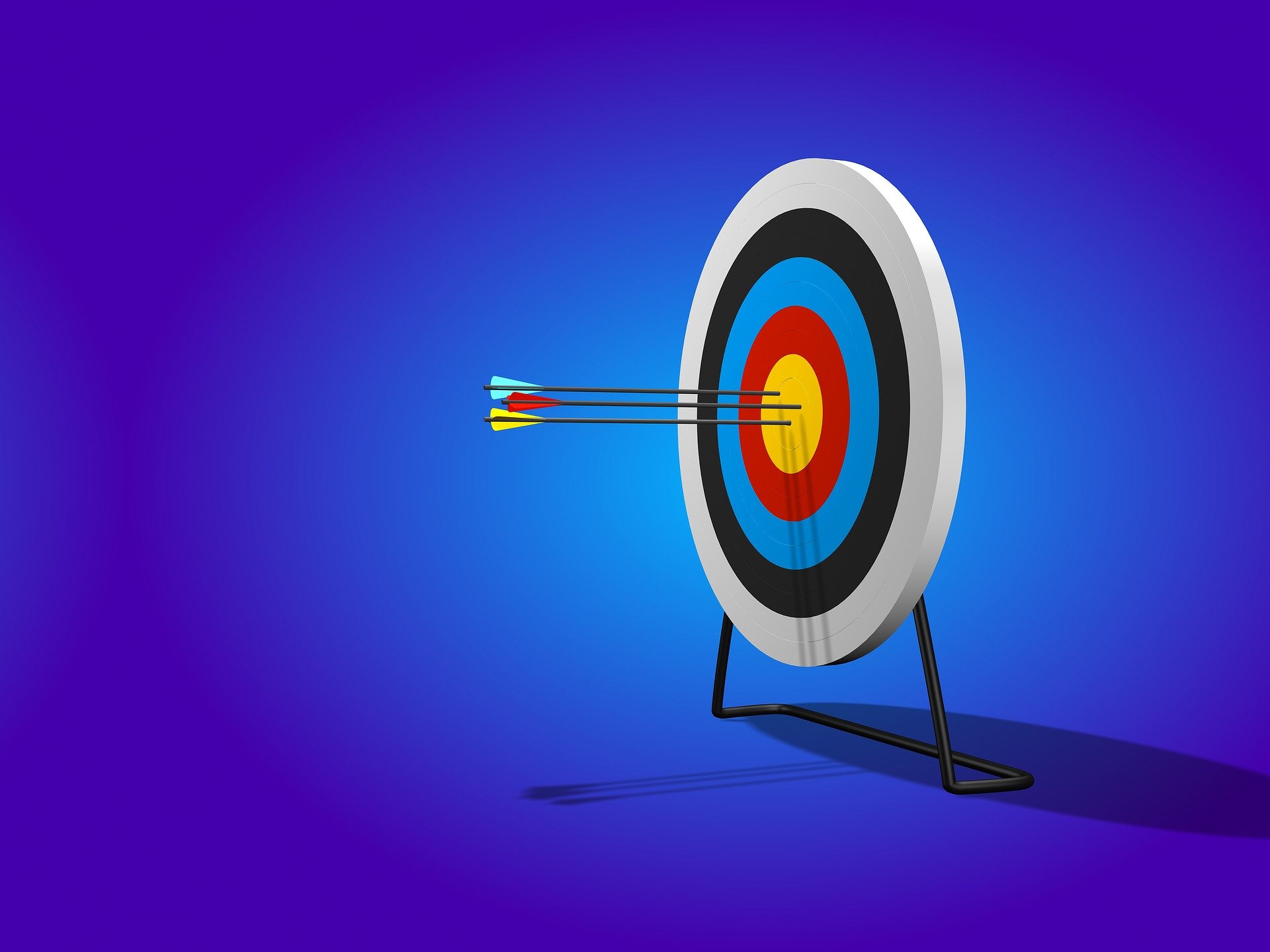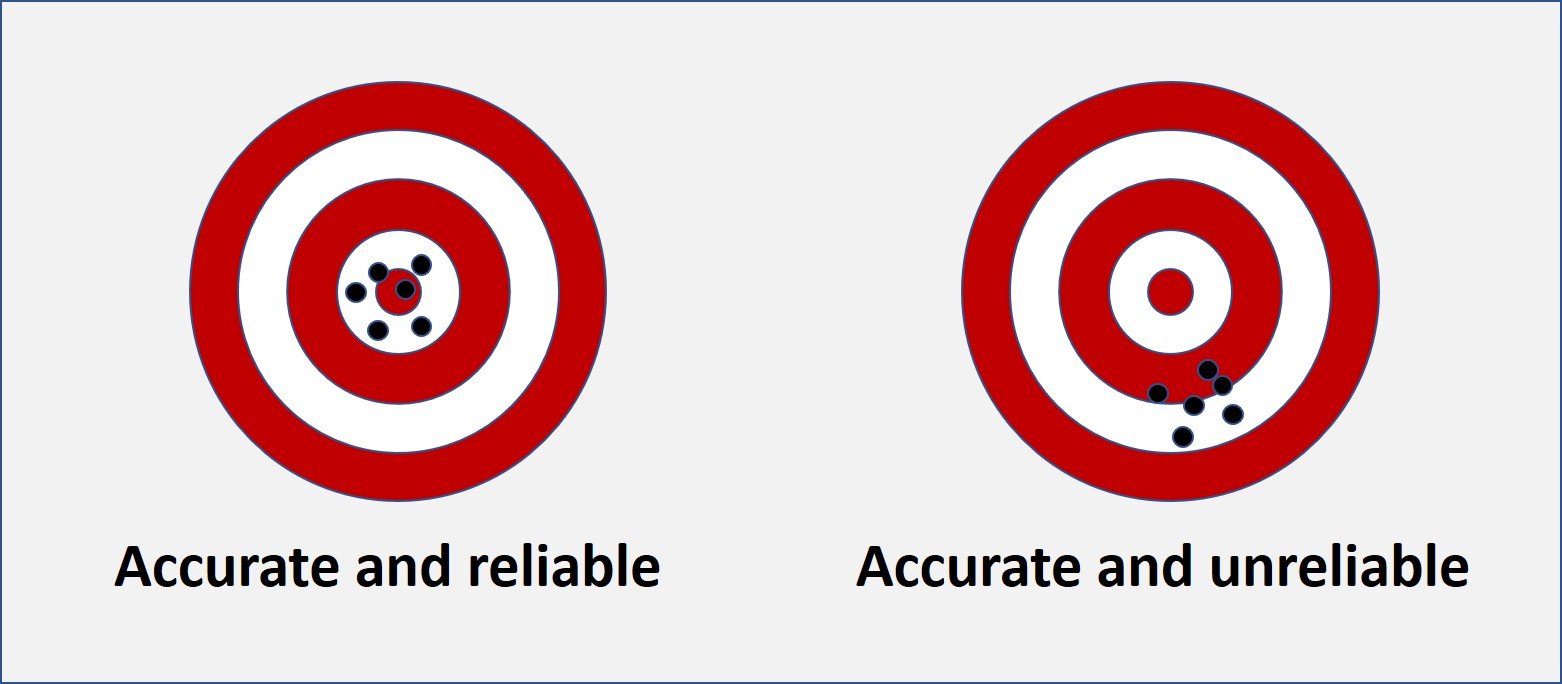What is accuracy? Definition and examples
Accuracy is the degree to which an expression or measurement conforms to a true value. It also has to do with correctness or absence of error. The term is more tightly defined in certain fields, e.g. scientists distinguish it from precision.
While accuracy pertains to correctness, as will be discussed later, it is also intrinsically linked to the reliability of the methodology used to obtain the data.

According to Merriam-Webster, the term covers three meanings:
- Correctness – as in lacking errors or mistakes
- Exactness – as in agreeing with a standard or conforming to truth
- Precision – as in the extent to which a measure conforms to a true value or standard
The following sentences give examples of use of the term.
- There are several ways to improve location accuracy in Google Maps.
- Sara scored high on factual accuracy and average on style in her history exam.
- In measurement, high accuracy corresponds to low error.
- The researcher tested the accuracy of the World Wide Web in answering some general knowledge questions.
- To ensure accuracy, the scientists carried out the experiments three times.
Accuracy and reliability
Certain fields that rely on measurement – such as science and engineering – distinguish between accuracy and reliability. In these instances:
Accuracy is about how close the measurement is to the true value.
Reliability is about getting the same value each time you take the measurement.
Imagine that taking a measurement is like shooting at a target. The bullseye represents the true value that you are trying to measure. The following image illustrates the difference between the two terms:

Precision
Scientists also differentiate between accuracy and precision. Precision is to do with the degree to which a measurement is correct.
A clock that measures time in seconds might be accurate in telling the time. However, a stopwatch that can measure tenths of a second has greater precision.
Accuracy of medical tests
When talking about the accuracy of medical tests, doctors and researchers use the terms sensitivity and specificity. These measures tell us how well a test can identify whether an individual does or does not have a disease.
A highly sensitive test returns few false negatives, and so misses fewer true positive cases. A highly specific test returns few false positives.
To illustrate this, let us consider a test for a virus. In clinical trials, the test showed 99% sensitivity and 96% specificity. This means that, for every 100 people known to have the virus, we can expect the test to correctly identify 99 of them and miss just one.
Also, for every 100 without the virus, the test would likely correctly identify 96 as virus free and also incorrectly return four positive results.
In medicine, it is important to differentiate between these two measures of accuracy. For example, a test with low specificity would not make a useful screening tool. It would screen too many people without the disease as positive, causing them to undergo unnecessary diagnostic procedures.
Technological advancements in sensor and calibration technologies have further enhanced the accuracy of various scientific instruments.
Derivatives of “accurate”
“Accuracy” is a derivative of the English root word “accurate,” which is derived from the Latin word “acccuratus,” meaning “done with care.” Let’s look at some derivatives of “accurate,” understand their meanings, and see how they are used in a sentence:
-
Accurate (adjective)
Free from error; precise.
Example: “Her accurate report ensured we had all the facts.”
-
Accuracy (noun)
The quality or state of being accurate.}
Example: “The accuracy of his statements was confirmed by the data.”
-
Inaccurate (adjective)
Not accurate; incorrect or untrue.
Example: “The forecast was inaccurate, and the storm took a different path.”
-
Inaccuracy (noun)
The quality or state of being inaccurate.
Example: “The inaccuracy of the witness’s testimony cast doubt on the case.”
-
Accurately (adverb)
In an accurate manner; with precision.
Example: “She described the events accurately to the police.”
-
Inaccurately (adverb)
Not accurately; with mistakes.
Example: “The article inaccurately portrayed the sequence of events.”
-
Accurateness (noun)
Conformity to truth or to a standard or model; precision.
Example: “The accurateness of the machine’s output was regularly checked.”
The word “accurate” doesn’t have a commonly used verb form in English.
Compound phrases with “accuracy”
A compound is a term that consists of at least two words. In business English, there are many compound phrases containing the word accurate. Here are some of them:
-
Data accuracy
The degree to which data accurately represents real-world situations, especially in market studies or research.
Example: “The success of our market strategy relies heavily on data accuracy in our recent consumer behavior study.”
-
Measurement accuracy
The degree to which a measured value represents the true value.
Example: “The measurement accuracy of our financial metrics is crucial for presenting a reliable picture to investors during the quarterly earnings report.”
-
Accuracy rate
The proportion of accurate outcomes in business processes or financial transactions.
Example: “The accounting team’s accuracy rate in financial reporting influenced the company’s decision to award bonuses for exceptional performance.”
-
Accuracy check
A test or procedure to ensure precision and correctness.
Example: “The finance team conducted an accuracy check on the quarterly report to ensure all figures aligned with the audit findings.”
-
Forecasting accuracy
The extent to which predictions about future business conditions prove to be correct.
Example: “Forecasting accuracy is critical for supply chain management to ensure inventory levels match consumer demand.”
-
Historical accuracy
Adherence to fact in the representation of historical events.
Example: “The film was praised for its historical accuracy in costume and setting design.”
Video – What is Accuracy?
This video, from our sister channel on YouTube – Marketing Business Network, explains what ‘Accuracy’ is using simple and easy-to-understand language and examples.

